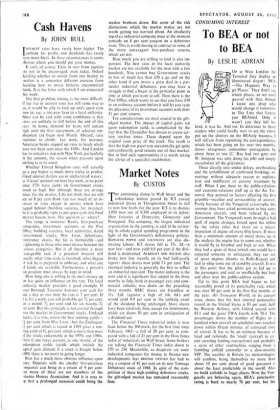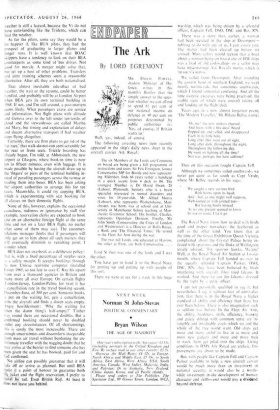To BEA or not
to BEA
CONSUMING "INTEREST -
By LESLIE ADRIAN
These classify into undue delays, overbooking and the unfulfilment of confirmed bookings, re- routings. without adequate reason or explana- tion and indifferent or cursory treatment by staff. When I put these to the public-relations and customer-relations staff up at the Air Ter- minal, they pointed to factors affecting the first grumble—weather and serviceability of aircraft. Partly because of the Vanguard catastrophe this summer they have asked permission to buy some American aircraft, and been refused by the Government. The Vanguards went through a bad spell of engine changes, forced upon the airline by the safety rules that insist on a micro- inspection of engine oil every fifty hours. If more than a minimum amount of metal shows up in the analysis the engine has to come out, whether it would fly to Istanbul and back or not. When they had a spate of these (which one would have expected someone to anticipate), they ran out of spare engines (thanks to Rolls-Royce) and had to whip some out of stand-by aircraft. It was at this point that the pilots got as fed up as the passengers and said so unofficially but loud and clear over the public-address system.
Up to this point BEA had begun to feel reasonably proud of its punctuality rate, which was over 80 per cent in the first five months of the year. Air Transport World, in its current issue, shows that the best internal punctuality record in the United States is 83 per cent, held by Western Airlines, with United second with 81.1 and the great TWA fourth with 78.4. The percentages shows the number of flights in a hundred when aircraft on scheduled runs touched down within fifteen minutes of estimated time of arrival. It has to be an estimate because of head and tailwinds, the 'stack' (aircraft in cir- cuit awaiting landing instructions) and probably a score of other eventualities ranging from a fumbling airfield controller to a slow-moving VIP. The weather in Britain (as meteorologists will confirm, being themselves no more than about 10 per cent ahead of good guessers) is about the least predictable in the world. Also we build airfields in foggy places. Now the Van- guards are behaving again, BEA's punctuality rating is back to nearly 76 per cent, but the
weather is still a hazard, because the Vs do not have auto-landing like the Tridents, which can beat the weather.
As for the pilots, some say they would be a lot happier if, like BUA pilots, they had the prospect of graduating to larger planes and longer runs. It is well known that BOAC skippers have a tendency to look on their BEA counterparts as some kind of 'bus driver. Not eood for morale. A merger might solve that, but set up a host of other problems. Transfers and joint training schemes seem a reasonable alternative. After all, they are both nationalised.
That almost inevitable side-effect of bad tt eather, the wait or the reroute, could be better handled. and probably will be at London Airport when BEA gets its own terminal building in 1968. If not, and I'm still around, a post-mortem seems likely. What passengers crave are service and information. Not flight plans with altitude and Geneva over to the left under ten-tenths of cloud and the stewardesses are called Martha and Mary, but timing and explanation of delays and decent alternative transport if bad weather stops flying altogether.
Certainly, there are firm plans to get rid of the 'rat race,' that walk-do-not-run semi-scramble for the 'rear or front seats. Trickle boarding has already begun, I'm told, at Abbotsinch, the new airport at Glasgow, where book-in time is now ten to fifteen minutes, even with luggage. It is made possible by having the aircraft draw up to the 'fingers' or piers of the terminal building in- stead of parading passengers across the tarmac or loading them into buses. BEA has been asking the' airport authorities to arrange this for ten years. Meanwhile, it could' try copying BUA, which is experimenting with seat booking for all classes on their domestic flights.•None of this, howeVer, explains the occasional
.
casualness, rudeness or ignorance 'by staff (for example, reservation clerks are expected to book You on an alternative fOreign flight at the same time and not on a later BEA flight, no matter What some of them may say). The customer- relations manager thinks that if passengers will anly get on to him about all such matters they %%ill eventually diminish to vanishing point. I wonder when.
BEA does not overbook as a deliberate policy: that is, with a fixed percentage of surplus seats asa safety margin. It accepts bookings through its new Univac real-time computer (installed Easter 1965, so too late to save C. Ray his upset) from over a thousand agencies in Britain and many more all over Europe. On certain flights London-Jersey, London-Palma for two) it has cancellation rate in the travel booking season, Decernber-June, of 300 per cent. Someone books, s put on the waiting list, gets a cancellation, loins the aircraft and finds a dozen seats empty. angry bewilderment: 'Why the waiting list when the damn thing's half-empty?' T'other say round there are occasional doubles. But a confirmed booking should never be doubled ander any circumstances. Of all shortcomings, :his is surely the most inexcusable. There are enough uncertainties and discomforts inseparable from mass air travel without, burdening the un- fOrtunate traveller with the nagging doubt that he may arrive at the barrier to find someone else has seen given the seat he has booked, paid for and iiad confirmed.
No airline can possibly guarantee that it will 1:Ve off or arrive as planned. But' until BEA .
make it a point of honour to guarantee both ticket and the flight. reservation, I prefer to havel by rail. you British Rail. At least it does not leave yOu behind.































 Previous page
Previous page